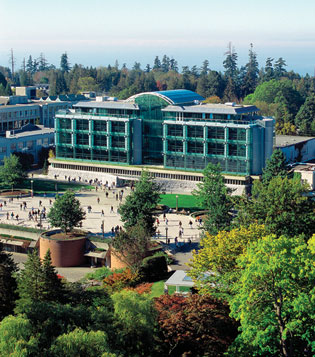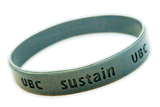

Environmental HighlightsIn 1997, UBC became Canada's first university to adopt a sustainable development policy. It opened the Campus Sustainability Office in 1998 and has since made significant progress in reducing its environmental impact. In 2003, UBC became Canada's first and only university to receive Green Campus Recognition from the US-based National Wildlife Federation. In 2004, UBC demonstrated leadership by purchasing enough Green Power Certificates from BC Hydro to power UBC's world renowned green buildings.
Reducing Resource UseDespite a 24 per cent increase in student population since 1998, UBC has reduced building energy use by 10 per cent, for annual savings of $2.5 million in 2004/05 and enough energy to meet the heating and electricity needs of 1,700 homes. Water use has been reduced by 32 per cent from 1998 levels, saving more than 1.7 billion litres in 2004/05; this is enough water to supply 14,700 Vancouver residents for one year. UBC has reduced its per capita consumption of paper by 31 per cent since 1998, and overall use of recycled paper has increased by 21 per cent. Reducing Environmental ImpactUBC has reduced CO2 emissions from buildings and transportation by nine per cent from 1998 levels, saving 12,300 tonnes last year alone. Upgrades to the central steam boilers lowered NO2 emissions by 85 per cent and reduced natural gas use by 3 per cent, enough to heat 650 homes for a year. UBC Waste Management diverted 46 per cent, or 2,490 tonnes, of material to recycling or composting last year. UBC is the fi rst and only university to launch an "in vessel" composting system for organic wastes. Transit ridership has increased 163 per cent since 1998, due in large part to the popular U-Pass program, and single occupancy vehicle traffic decreased by 20 per cent. Improving Eco-efficiencyLast year, 130 volunteer sustainability coordinators in units across UBC undertook more than 250 sustainability initiatives from the UBC sustainability toolkit designed to foster more sustainable behaviours; and saved the university $75,000 in electricity. In 2004/05, UBC's innovative Social, Ecological, Economic Development Studies (SEEDS) program attracted 350 students, faculty and staff to various research projects, saving $60,000 in energy and other costs. Academic LeadershipUBC researchers such as Dr. Daniel Pauly, who studies diminishing international fish stocks, and Dr. William Rees, who has developed the influential Ecological Footprint analysis of environmental load, are international leaders in their fi elds. Prof. Larry Frank's analysis of obesity and suburban lifestyles has been widely discussed, and Dr. Patrick Condon's views on the way we build cities are highly sought. UBC Architecture Prof. Ray Cole developed the Residential Environmental Assessment Program (REAP), a new building rating standard for residential construction that encourages innovative heating systems, local materials, and high-efficiency appliances to minimize energy and water consumption and decrease waste production.
|
|||||

